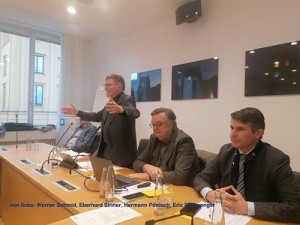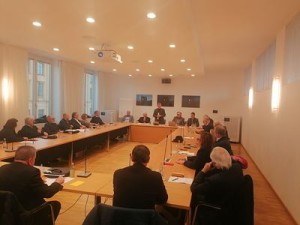Open General Meeting with guest lecture
In his opening speech, President Eberhard Sinner made it clear that the OWWF Bayern, which was founded as the OstWestWirtschaftsClub Bayern back in 1968, has always seen itself as a "bridge builder". Our core competence is to bring together the fields of business, science and politics and, through our large network, to open and keep open channels of dialogue that could not and cannot be established through "official" channels because of existing obstacles - in the past the "Iron Curtain", today the Russian invasion of Ukraine. Especially in turbulent times like today, it is essential not to let these contacts break off.
At the general meeting, President Sinner referred to our activities, especially online during the pandemic. Up-to-date reports on these are published on our homepage.
Before the new Board was elected, President Sinner thanked the retiring Vice-Presidents, former Minister of State Franz Pschierer and Werner Schmid, for their many years of cooperation and support. You can find the newly or re-elected board members on the corresponding page of our homepage.
Guest speaker Jens Böhlmann, Director of SMEs | Green Deal at the Committee on Eastern European Economic Relations, then presented the opportunities that the countries of the Caucasus region and Central Asia offer for the German economy. The region is surrounded by the Russian Federation in the north, the People's Republic of China in the east and Turkey, Iran and Afghanistan in the south. According to Böhlmann, the countries realise that a partnership with China at eye level is not possible. Chinese investors, mostly state-owned or state-affiliated, always follow a clear pattern. They penetrate a market segment, try to monopolise it, and then dictate the prices. At the same time, this approach offers the advantage of know-how transfer in favour of China.
The Chinese initiative "One belt - one road", known to us as the "New Silk Road", is also being worked through according to a similar pattern. First, China offers generous loans for infrastructure projects, which are then carried out by Chinese companies with Chinese workers. Added value for the countries involved: ZERO. And if the loans cannot be serviced, China lets itself sign over ports (Sri Lanka) or interesting lands (Montenegro).
The group of countries is experiencing stable economic growth and increasing trade figures with Western countries. Böhlmann emphasised how relevant strategic and longer-term partnerships with these nations are. Especially since the Federal Republic imports relevant raw materials and primary goods from the region.
At the end of his presentation, Jens Böhlmann particularly emphasised the urgency of the situation. China and Russia are already investing large sums in the region; they are gaining influence this way. Europe must now jump on this bandwagon in order not to be left behind. This includes strategic partnerships in the field of education and labour transfer, as well as investments in local infrastructure.


